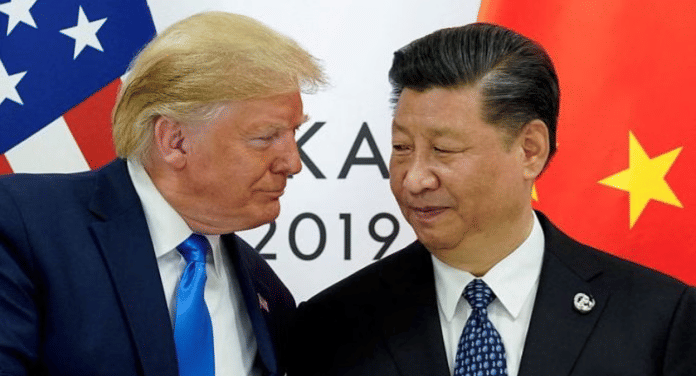China’s verdict on the American airstrikes on Iran is clear: Beijing leads on peace; Washington on chaos. Its response to the United States’ recent attack on Iran’s nuclear facilities was outright condemnation. Russia aligned closely, warning that Washington’s global credibility has suffered yet another blow. Public sentiment largely echoes this narrative, with social media users portraying the attack as ensnaring US President Donald Trump in a dangerously complex trap.
Chinese public opinion coalesces around decisive views: Trump’s reckless military intervention has driven the Middle East to a perilous tipping point. The US and Israel emerge as unmistakable aggressors, while Iran is framed as standing on a moral high ground. Commentators lament a spiralling cycle of violence among Iran, Israel, and the US—a conflict with no foreseeable resolution.
No-win game for the US
Chinese analysts broadly view the US position as a strategic dead-end, and that the Trump administration seeks compromise but is structurally incapable of achieving it.
Chen Feng, an Observer (Guancha) columnist, sums up the dilemma: Trump’s strike on Iran’s nuclear sites has locked him in a lose-lose trap. Thriving on spectacle and drama, Trump’s alliance with Israeli Prime Minister Benjamin Netanyahu was theatrical, flaunting a ‘team’ dynamic that boosted his bravado.
But the show came at a high cost. Iran’s swift retaliation, hitting Israeli cities like Haifa with homegrown missiles, exposed cracks in Israel’s defences and turned the region’s airspace volatile.
Attempts at regime change risk uniting Iran’s factions instead of breaking them. Chen warns, “Removing leaders like (Ayatollah Ali) Khamenei won’t erase Iran’s ideology. What Netanyahu calls ‘lasting peace’ may spark endless war. With the fuse lit, both he and Trump hold the match.”
Adding to this perception of instability, viral content on microblogging site Weibo portrays scenes of Israelis fleeing via Egypt’s Taba crossing, invoking historical echoes of Jewish diasporas.
Hu Xijin, former editor-in-chief of the Global Times, dismisses Trump as politically untrustworthy; a leader whose promises are tactical manoeuvres and not genuine commitments. He critiques American imperialism as inherently deceitful, a bully to the weak and craven before rivals. For over three years, Hu argues, Russia’s nuclear posture has been a check on Western ambitions; and Trump’s erratic policies toward Russia, North Korea, and Iran reveal imperialism’s frailty under pressure.
Liu Zhongmin, a professor at Shanghai Foreign Studies University and vice president of the China Middle East Society, notes a clear downward trajectory for US influence in the Middle East. He argues that the intricate trilateral relationship between the US, Israel, and Iran is becoming increasingly unstable and unpredictable.
Also read:
Rising narrative of defiance
On Weibo, the question dominating the discourse is this: how would Iran retaliate? Hashtags like Iran is on fire have drawn nearly a billion views, projecting a rising tide of support for Iran’s defiance. The narrative that Iran is “setting an example for the world” is gaining momentum.
While many acknowledge Iran’s limitations in striking the US mainland directly, there is consensus that Tehran will retaliate asymmetrically, through unpredictable and potentially destabilising tactics.
Wang Jin, director of the Center for Israeli Studies at Northwest University, foresees intensified regional conflict as longstanding red lines crumble. He anticipates that the US will soon claim a diplomatic victory, but warns this could provoke severe backlash within Iran, including escalated attacks on American interests across the Middle East. Despite Iran’s increasingly fragile position, facing dwindling foreign support and stretched resources, its resolve appears unyielding.
Some commentators advocate for a potential China-Russia-Iran “grand alliance” to counter US hegemony, a prospect that would further reshape the geopolitical landscape.
Also read:
China’s calculated role
For China, Iran is not just a geopolitical concern but a crucial economic partner. Niu Xinchun, executive director of the China Institute of Arab Studies, highlights the security challenges threatening Chinese investments and business activities in Iran, especially in engineering and technology exports.
Zou Zhiqiang, a researcher at Fudan University’s Center for Middle East Studies, stresses that China is prioritising efforts to broker a ceasefire between Iran and Israel, alongside pushing for a diplomatic settlement between Iran and the US.
A commentator noted China’s caution about direct intervention in Iran due to the risks. Yet, Iran’s strategic role—as a Shanghai Cooperation Organisation (SCO) member, key Belt and Road Initiative (BRI) partner, and an ancient civilisation and resource-rich nation—means China cannot remain passive.
It must balance non-intervention with leadership by upholding the moral high ground, condemning aggression, promoting peace, and deepening diplomatic and cultural ties. The consensus: avoid military involvement but engage actively to shape the region’s future.
As the Middle East conflict escalates, with the US now deeply involved, it opens a new front for China-Russia cooperation and an opportunity for Beijing to assert its narrative of resistance against perceived American unilateralism and hegemony. In this discourse, China positions itself as the peacemaker and promoter of stability, in stark contrast to the US, framed as the escalator of conflict.
Sana Hashmi is fellow at the Taiwan-Asia Exchange Foundation. She tweets @sanahashmi1. Views are personal.
(Edited by Zoya Bhatti)






